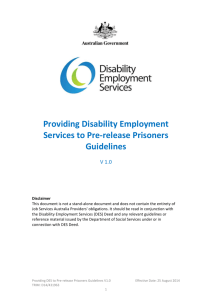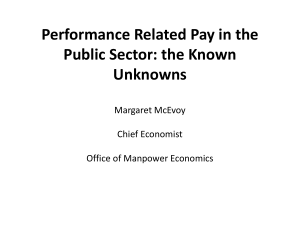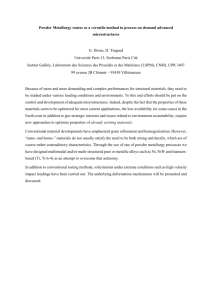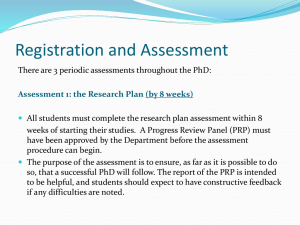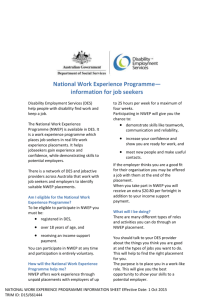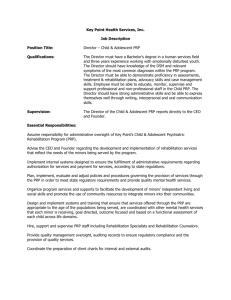Providing Disability Employment Services to Pre
advertisement
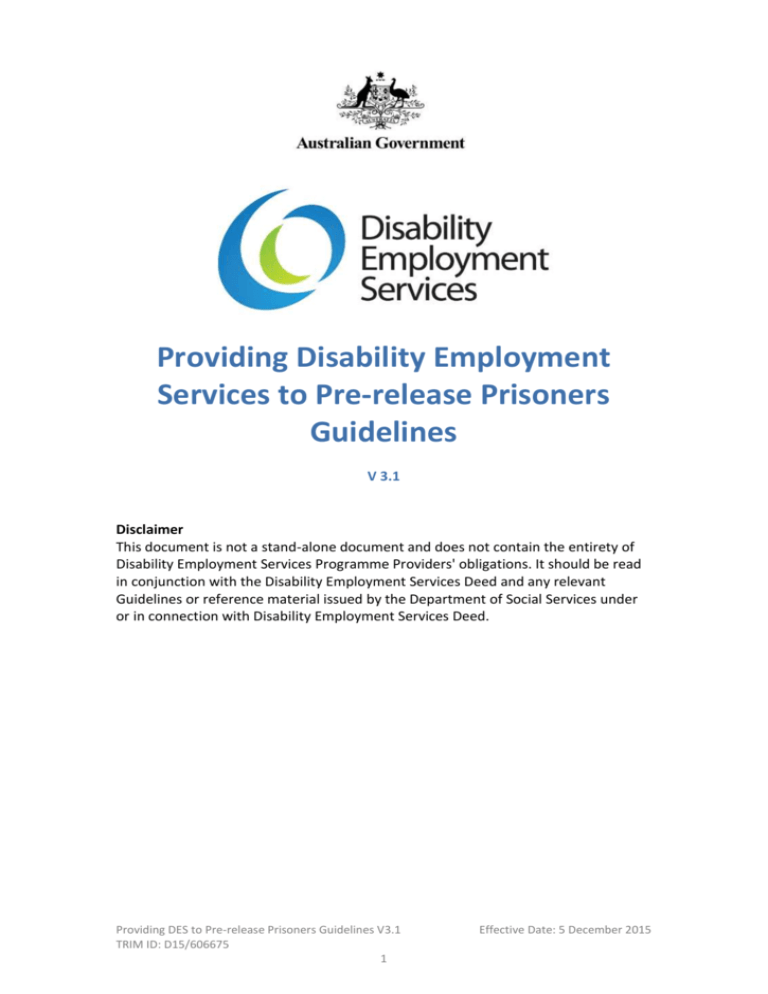
Providing Disability Employment Services to Pre-release Prisoners Guidelines V 3.1 Disclaimer This document is not a stand-alone document and does not contain the entirety of Disability Employment Services Programme Providers' obligations. It should be read in conjunction with the Disability Employment Services Deed and any relevant Guidelines or reference material issued by the Department of Social Services under or in connection with Disability Employment Services Deed. Providing DES to Pre-release Prisoners Guidelines V3.1 TRIM ID: D15/606675 1 Effective Date: 5 December 2015 Table of Contents Overview 3 Eligibility 3 Registration 4 Servicing PRP job seekers 4 The Job Plan 5 Prior to release (21 days prior to the prisoner’s expected release date) 5 Document Change History Version Start Date Effective Date End Date Change & Location 3.1 5 Dec 15 5 Dec 15 3.0 25 Aug 14 25 Aug 14 4 Dec 15 Throughout document – amended to new template. Additional text added relating to monitoring and removal of PRP indicator. 2.1 01 May 13 01 May 13 24 Aug 14 p 3 Age of youth detainees amended from 20 to 21 2.0 01 Jul 12 21 Aug 12 01 May 13 Throughout document – amended to be correct template, updated references to Centrelink to reflect DHS; grammatical updates throughout. 1.0 01 Sep 11 01 Sep 11 30 Jun 12 Original Update of terminology Providing DES to Pre-release Prisoners Guidelines V3.1 TRIM ID: D15/606675 2 Effective Date: 5 December 2015 Providing Disability Employment Services (DES) to Pre-release Prisoners Guidelines Overview The Pre-release Prisoners (PRP) initiative provides access to employment services to adult prisoners who have been referred to an employment services provider by a state or territory corrective services agency; and for 15 to 21 year old detainees or prisoners who are not in full-time education or training and who are registered with the Department of Human Services (Human Services) as looking for work. PRP policy in DES aims to maximise employment opportunities for people leaving prison and reduce their reliance on welfare by improving their job search skills and building connections with employers at the earliest opportunity. A PRP job seeker must be referred to a DES provider by a state or territory corrective services agency. The PRP job seeker will be referred to DES Provider that is deemed suitable by the corrective services agency. The suitability of the DES Provider will depend on the consideration of factors such as proximity to the prison or pre-release centre and the DES Provider’s performance and experience in servicing PRP job seekers. A PRP job seeker is considered to ‘remain in legal custody’ and does not qualify for any Human Services administered payment (See Social Security Act 1991 Section 1158 23(5)). Eligibility A PRP job seeker must meet all of the following criteria at the same time when they are being referred to a DES Provider: be in the last 12 months of their sentence; be considered by corrective services case managers to be granted a licence for release to engage in paid work; and be considered job ready. The referring state or territory corrective services agency is responsible for assessing a PRP job seeker’s eligibility. However, if a PRP job seeker is incorrectly referred and does not fulfil the above criteria the DES Provider should Exit the job seeker. The process for exiting job seekers is outlined in the Programme Review, Programme Summary and Exits Guidelines on the DES Provider Portal. Ex-Prisoners who have left a pre‐release centre and are in receipt of income support from Centrelink may be eligible for employment services through referral by Human Services. Once the job seeker is in receipt of income support from Centrelink, the PRP indicator is no longer relevant and needs to be removed. The Department of Employment’s national office monitors and removes PRP indicators. Providing DES to Pre-release Prisoners Guidelines V3.1 TRIM ID: D15/606675 3 Effective Date: 5 December 2015 Registration PRP job seekers must be Directly Registered by the DES Provider following a referral from the state or territory corrective services agency. DES Providers must initially complete a Registration in the Department’s IT System (refer to the DES Direct Registration Guidelines) and then apply the ‘Pre-release Prisoner’ Special Client Type indicator to the job seeker’s record. As PRP job seekers are assessed by corrective services agency as job ready, a timely commencement and servicing is expected. PRP job seekers who are referred to a DES provider are Directly Registered in accordance with the DES Direct Registration Guidelines and the Eligibility, Referral and Commencement Guidelines. PRP job seekers will be referred for an Employment Services Assessment (ESAt) to determine their eligibility for DES. Where an ESAt is required, the DES provider should notify corrective services that the PRP job seeker requires a referral. Corrective services need to be involved in the process and to approve the referral for an ESAt. If the outcome of an ESAt recommends a different employment service or a different DES Provider to the one that directly registered the PRP job seeker, the Provider must not action the referral. Instead, the DES Provider should notify their Contract Manager of the recommendation. The Contract Manager will then seek permission from the corrective services agency for the PRP to be referred to the recommended service and, if permission is granted, arrange for the PRP job seeker to be connected to the recommended service or DES Provider. Where a PRP job seeker is subsequently released from prison and claims an Income Support Payment from Centrelink and has a Mutual Obligation Requirement, the DES Provider must remover the Special Client Type identifier at their first Contact with the job seeker after their release. For further information please refer to the ‘Job Seeker Classification Instrument Guidelines’ and the ‘Explanation of the Job Seeker Classification Instrument Questions Supporting Document’ on the DES Provider Portal. Servicing PRP job seekers PRP job seekers must receive the same level of services required under the DES Deed that are available to other DES Participants. In some instances PRP job seekers may require additional consideration related to their PRP status and the requirements of corrective services arrangements in place in different states and territories. PRP job seekers who are referred to DES are eligible for the services from either the DES - Disability Management Service (DMS) or DES - Employment Support Service (ESS) as determined by their ESAt including: Initial Interview to assess the Participant’s circumstances and employment assistance requirements and develop a Job Plan. Providing DES to Pre-release Prisoners Guidelines V3.1 TRIM ID: D15/606675 4 Effective Date: 5 December 2015 Employment Assistance to help the Participant find sustainable employment by addressing vocational and non-vocational barriers and building their capacity to work. Post Placement Support to ensure that the Participant settles into the placement and addresses any issues that arise. Ongoing Support to assist the participant to maintain their employment. The Job Plan The DES Provider will negotiate a Job Plan with the PRP job seeker at the Initial Interview. The following restrictions placed on PRP job seekers will need to be taken into account when negotiating the Job Plan: proximity to the prison or pre-release centre; terms of their access to the internet; where they can travel to look for work; the type of jobs they can be referred to; and the employers they can work for. For more information regarding Job Plans, please refer to the Job Plans Guideline available on the Provider Portal. Prior to release (21 days prior to the prisoner’s expected release date) Prisoners who are soon to be released, or have recently been released, from prison will be assessed by Human Services to determine their Income Support Payment entitlement and their eligibility for employment services. Providing DES to Pre-release Prisoners Guidelines V3.1 TRIM ID: D15/606675 5 Effective Date: 5 December 2015
